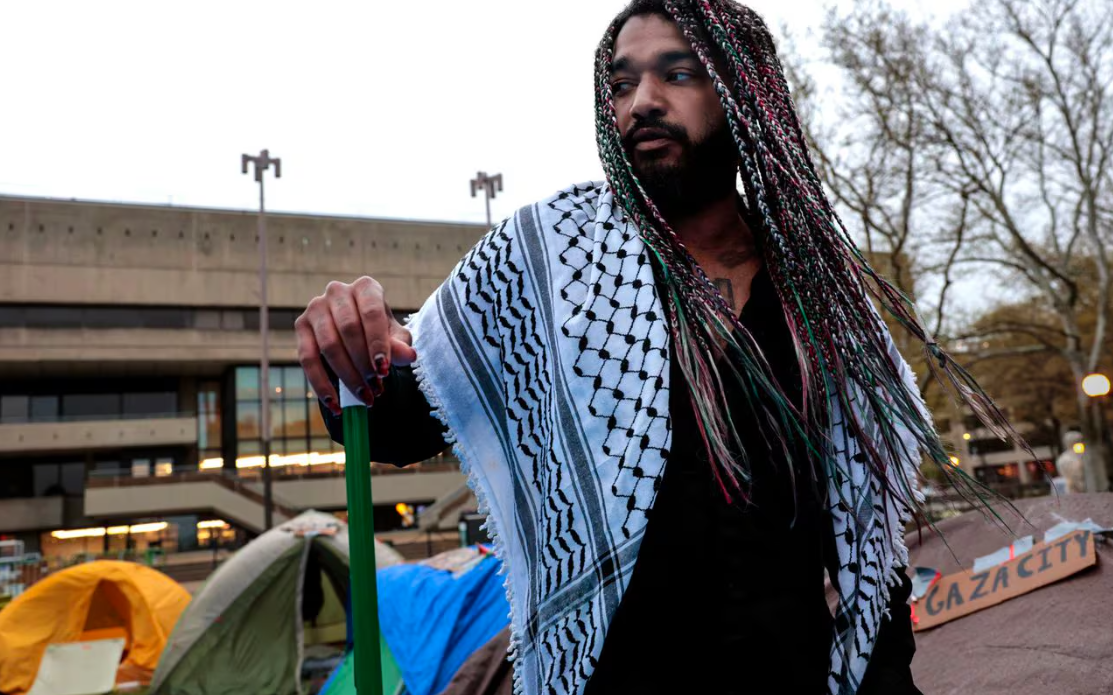麻省理工学院和哈佛大学停课抗议者被禁止毕业,并被驱逐出校园宿舍

【中美创新时报2024 年 5 月 12 日编译讯】(记者温友平编译)上周,丹·芝诺(Dan Zeno)因参加未经授权的抗议加沙战争的营地而被麻省理工学院停学,这迅速影响了他家人的生活。 这名研究生不仅被禁止上课,还与他的妻子和 5 岁的女儿一起被赶出校园住房,只有一周的时间才能找到另一个住处。《波士顿环球报》记者Shelley Murphy、Alexa Coultoff 和 Maddie Khaw 对此作了下述报道。
“我的女儿是最重要的,”35 岁的芝诺说,他是一名空军退伍军人,就读于麻省理工学院斯隆管理学院 MBA 课程。他正忙着在佐伊上幼儿园的剑桥寻找替代住房。“我们正在努力让她保持正常的感觉。”
然而,尽管停学扰乱了他家人的生活,芝诺表示,他仍然“毫无保留地完全致力于”由学生主导的努力,迫使麻省理工学院在残酷的战争中削减与以色列国防部的研究合同。
芝诺说:“与巴勒斯坦人在加沙所经历的风险相比,我们所承担的风险微不足道。” “作为一种军事策略,故意让儿童挨饿。这是一个超级紧急的情况。”
芝诺于 4 月 21 日帮助组织了麻省理工学院的“科学家反对种族灭绝”露营活动,他说他对每天从加沙直播的图像感到震惊,并正在进行“一次深刻的精神之旅”,公开反对不公正现象。
一些被停学的学生将无法按计划毕业,另一些学生因奖学金被取消而失去了收入,还有一些学生的研究项目被叫停。然而,他们发誓要继续抗议。
自10月7日哈马斯袭击以色列、造成1200多人死亡、约250名人质以来,全国各地校园爆发示威活动,引发以色列对加沙的大规模袭击。据当地卫生官员称,加沙已有超过 34,000 人死亡,其中三分之二是妇女和儿童。
大学一直在打击营地,对学生进行纪律处分和逮捕。
周三,就在麻省理工学院警告抗议者如果不撤离克雷斯吉草坪营地将面临纪律处分两天后,管理人员向一些参加活动的人发出了一系列停课通知。发言人拒绝透露有多少学生被停学,但抗议组织者表示至少有两打。
麻省理工学院化学工程专业大四学生、营地组织者萨菲亚·奥贡迪佩 (Safiyyah Ogundipe) 表示,她周三收到一封电子邮件,通知她被停职。 她被禁止在月底参加期末考试或与毕业班一起散步。从周三开始,她也面临着被学生宿舍驱逐的情况。
“我的家人对此不太高兴——这是轻描淡写的说法,”来自弗吉尼亚州的 21 岁奥贡迪佩说。
她在周四接受采访时表示:“当我到达终点时,却感觉自己没有冲过终点线,这确实感觉很奇怪。” “但我想我们会找到出路的。”
她仍然希望麻省理工学院纪律委员会在听证会后推翻对她的停职,为她毕业铺平道路。“我只需要日复一日地承受。”
尽管如此,尽管她的学术前景尚不明朗,奥贡迪佩表示,她对亲巴勒斯坦抗议运动的承诺也不明朗。
“这是我在麻省理工学院经历的最动荡的几年之一,但也是最有价值的,”她说。
周五早些时候,警方拆除了麻省理工学院的营地,并逮捕了包括奥贡迪佩在内的 10 名学生,使麻省理工学院成为波士顿地区继爱默生学院和东北大学之后第三所抗议者被强行带出营地并受到指控的大学,罪名主要是非法侵入。
尽管芝诺不是周五被捕的麻省理工学院学生之一,但两周前,他在艾默生郊外被捕,当时警方从公共小巷清理了学校的营地,拘留了 100 多人。芝诺对扰乱治安的指控被驳回,以换取他同意执行 40 项社区服务时间行动。
芝诺说,他认为学校采取的纪律处分对人们来说可能比逮捕更严厉。但是,抗议的学生对这场斗争有强烈的感受,他将其与几十年前的学生反越南抗议和反种族隔离运动进行了比较。
周五,波士顿地区最后一个亲巴勒斯坦营地所在地哈佛大学开始暂停那些拒绝离开临时帐篷区的抗议者。那些被停学的人被告知他们不能参加考试或参加毕业典礼或其他学校活动,他们将被逐出学生宿舍。
哈佛大学计算机科学专业二年级学生科乔·阿奇姆蓬(Kojo Acheampong )也是该校露营活动的组织者之一,他也是被停职的人之一。
“显然有一个震惊的时刻。就像,‘哦,这真的发生了。’你打电话给你的家人,他们都快疯了,”阿奇姆蓬说。但他说,作为一名组织者,他预计自己会成为攻击目标,并且必须做出牺牲。
“它符合我引以为傲的遗产,”阿奇姆蓬说。“我为组织者对抗南非、越南和所有人的正确解放的历史感到自豪。所以这种类型的镇压意味着我们正在做我们的工作。”
阿奇姆蓬说,哈佛的停学意味着“你基本上被开除了,在停学之前你不能回到院子或任何建筑物或类似的地方”。他说他被告知要在周六中午之前离开校园。
他说他“很幸运”,因为他在被停学之前完成了期末考试,但他的父母对他和大学都感到不安,并询问停学可能对他的未来产生的影响。
阿奇姆蓬说:“我认真对待我是一名组织者这一事实,并且我认真对待这一事实,即为此必须为这场运动做出一定的牺牲。” “我对可能发生的事情做好了心理准备。 这就是我的满足。 我不想做任何其他事情。”
至于他可能被捕的可能性,阿奇蓬说,“我真的不担心,因为我知道我们站在历史正确的一边。”
《波士顿环球报》记者艾娃·伯杰对此报道做出了贡献。
题图:一名自称芝诺(Zeno)的麻省理工学院研究生正在参观位于剑桥麻省理工学院克雷斯吉草坪的“反对种族灭绝科学家”营地。CRAIG F. WALKER/GLOBE STAFF
附原英文报道:
Suspended MIT and Harvard protesters barred from graduation, evicted from campus housing
By Shelley Murphy, Alexa Coultoff and Maddie Khaw Globe Staff and Globe Correspondent,Updated May 12, 2024
CAMBRIDGE — Dan Zeno’s suspension from the Massachusetts Institute of Technology last week for participating in an unauthorized encampment protesting the war in Gaza had a swift impact on his family’s life. The graduate student has not only been barred from classes, he was also evicted from campus housing, along with his wife and 5-year-old daughter, with just one week to find another place to live.
“My daughter is the most important thing,” said Zeno, 35, an Air Force veteran enrolled in MIT’s Sloan School of Management MBA program. He is scrambling to find alternative housing in Cambridge, where Zoey attends kindergarten. “We’re trying to keep a sense of normalcy for her.”
Yet, even as the suspension has upended his family’s life, Zeno said he remains “fully committed, without reservation” to the student-led effort to compel MIT to cut research contracts with the Israeli Ministry of Defense amid the brutal war.
“The level of risk we are taking on is nothing compared to what Palestinians are going through in Gaza,” Zeno said. “Children are being intentionally starved as a military strategy. This is a super urgent situation.”
Zeno, who helped organize MIT’s “Scientists Against Genocide” encampment on April 21, said he’s horrified by daily images being livestreamed from Gaza and is on “a deeply spiritual journey” to speak out against injustice.
Some suspended students won’t be graduating as planned, others have lost income with their fellowships canceled, and some have had their research projects halted. Yet, they vowed to continue protesting.
Demonstrations have erupted at campuses across the country since Hamas attacked Israel on Oct. 7, killing more than 1,200 people and taking about 250 hostages, triggering a massive attack on Gaza by Israel. More than 34,000 people have died in Gaza, two-thirds of whom are women and children, according to local health officials.
Colleges have been cracking down on encampments with disciplinary action against students and arrests.
On Wednesday, two days after MIT warned protesters they would face discipline if they did not vacate the encampment on Kresge Lawn, administrators sent a flurry of suspension notices to some of those who were participating. A spokesperson declined to say how many students were suspended, but protest organizers said there were at least two dozen.
Safiyyah Ogundipe, a chemical engineering senior at MIT and organizer of the encampment, said she received an email Wednesday notifying her of her suspension. She is barred from taking final exams or walking with her graduating class at the end of the month. She, too, faces eviction from student housing, effective Wednesday.
“My family is not too pleased about it — that’s an understatement,” said Ogundipe, 21, of Virginia.
“It does feel very weird to come to the very end and not feel like I came over that finish line,” she said during an interview Thursday. “But I think we’ll find a way out.”
She remained hopeful MIT’s Committee on Discipline will overturn her suspension after a hearing, paving the way for her graduation. “I just have to take it day by day.”
Still, even as her academic future is unclear, Ogundipe said her commitment to the pro-Palestinian protest movement is not.
“This has been one of the most tumultuous years that I’ve been through at MIT, but also the most rewarding,” she said.
Early Friday, police dismantled the MIT encampment and arrested 10 students, including Ogundipe, making MIT the third Boston-area college — following Emerson College and Northeastern University — where protesters were forcibly removed from encampments and charged, mostly for trespassing.
Although Zeno was not among the MIT students arrested Friday, he was arrested two weeks ago outside Emerson when police cleared that school’s encampment from a public alley, detaining more than 100. Zeno’s charge of disorderly conduct was dismissed in exchange for his agreement to perform 40 hours of community service.
Zeno said he believes the disciplinary action taken by the school is probably more severe for people than an arrest. But, the protesting students feel strongly about the fight, which he compared to the student anti-Vietnam protests and anti-apartheid movements decades ago.
On Friday, Harvard University, the site of the last pro-Palestinian encampment in the Boston area, began suspending protesters who refused to leave the area of makeshift tents. Those suspended were told they can’t sit for exams or participate in commencement or other school activities, and they will be evicted from student housing.
Kojo Acheampong, a Harvard sophomore studying computer science and an organizer of the school’s encampment, was among those suspended.
“Obviously there’s a moment of shock. It’s like, ‘Oh, it’s actually happening.’ You’re making calls to your family members and they’re going crazy,” Acheampong said. But, as an organizer, he said, he expected to be targeted and to have to make sacrifices.
“It fits into a legacy that I’m proud of,” Acheampong said. “I’m proud of the history of organizers who fought against South Africa, Vietnam, proper liberation of all people. So this type of repression means that we’re doing our job.”
The suspension from Harvard means “you’re essentially booted out, and you can’t come back to the yard or any buildings or things like that until after” the suspension, Acheampong said. He said he was told toleave campus by noon Saturday.
He said he “got lucky” because he finished his finals before being suspended, but his parents are upset at both him and the university and were asking about the impact the suspension may have on his future.
“I take seriously the fact that I’m an organizer and I take seriously the fact that that comes with certain sacrifices that have to be made for the movement,” Acheampong said. “I mentally prepared myself for what can happen. And this is what fulfills me. I wouldn’t want to do anything else.”
As for the possibility that he could be arrested, Acheampong said, “I’m genuinely not worried, because I know that we’re on the right side of history.”
Globe correspondent Ava Berger contributed to this report.

